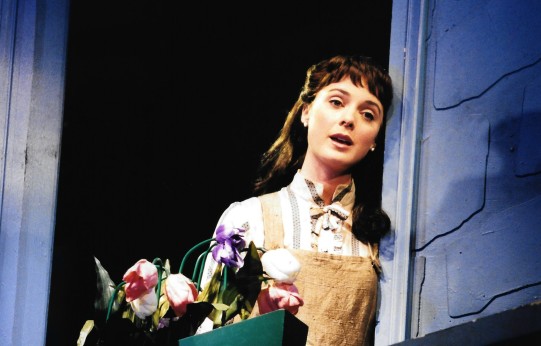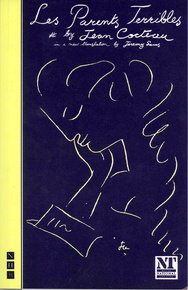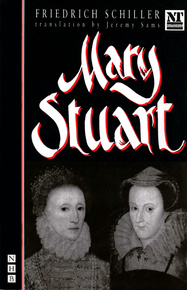
Amour
- Full Length Musical, Drama, 1940s / WWII
- 6M, 3F
- ISBN: TW-9682
Set in Paris shortly after World War II, Amour concerns the meek and unassuming Dusoleil, a beleaguered clerk who secretly pines for the lovely but unhappily married Isabelle. When Dusoleil inexplicably develops the ability to walk through walls, he becomes a Parisian Robin Hood, stealing from the rich and giving to the poor. Word of the infamous thief spreads, intriguing Isabelle in particular, and shy Dusoleil faces a morel dilemma -- will he continue his righteous campaign, or come clean and rescue Isabelle from her unhappiness?
Amour was adapted from the 1943 short story Le Passe-Muraille by Marcel Aymé. The story is memorialized by a statue in Montmartre in Paris.
The show is through-composed and contains no dialogue between musical number.
Description
- Full Length Musical
- Drama
- Time Period: 1940s / WWII
- Set Requirements: Unit Set/Multiple Settings
- Performance Group:
- College Theatre / Student, Community Theatre, Professional Theatre
- Accolades:
- Le Passe-Mauraille the show was awarded the Prix Molière for Best Musical, Under its original French title
On his way up the stars Dusoleil curses at yet another power outage, a symptom of postwar austerity. When the lights come back on, he, to his astonishment, is not outside his flat, but in it (Dusoleil Walks Through the Wall). Where has he acquired this mysterious gift of being able to pass through solid walls? He solicits medical attention (The Doctor's Song). Clutching the pills the Doctor has prescribed, he returns home, choosing to ignore his newfound powers. His life may not be spectacular, but at least it's familiar (An Ordinary Guy). The next day, however, he is grossly insulted by his new boss and uses his gifts to wreck glorious vengeance (Dusoleil Insulted/Revenge).
Meanwhile, Isabelle is sad and lonely (Somebody). Her plight is ignored by an uncaring husband who has his own private pleasures (Prosecutor's Song). Dusoleil now decides to use his powers to do good. Under the nom de crime of Passepartout, he begins his Robin Hood campaign by making a gift of diamonds to a rather dejected whore who is failing to attract the business she did during the war (The Whore's Lament/Monsieur Passepartout). Dusoleil may be able to walk through walls, but he still lacks the courage to declare himself to Isabelle. She, however, has turned her fantasies towards this Passepartout, her new hero (Isabelle's Song). The Painter notices his secret passion and warns him against acting on it. Nevertheless, Dusoleil hatches a plan. He will break into the deepest vault of the Banque de Paris and set off the alarm, causing himself to get caught in flagrante. How will Isabelle be able to resists? (Act One Finale/Java of the Latest News).
We are now in court (Transformation). Dusoleil is represented by a nervous young lawyer, his only protection against the wrath of Isabelle's husband, the Public Prosecutor (The Lawyer's Plea/Summing Up). The somewhat bizarre proceedings are interrupted by the appearance of Isabelle. She has an astonishing revelation: her husband was a Nazi collaborator in the war. He should be on trial, no Dusoleil. Dusoleil explains that everything he did, he did for love (Duet for Dusoleil & Isabelle). And, this being France, he is pardoned. However, just as he is about to follow Isabelle home, he loses his nerve. The entreaties of the company, nonetheless, prevail, and our two lovers spend a night of passion together (Whistling Ballet/Amour).
The next morning Dusoleil is awakened by the world press, all keen for him to display his powers for the cameras. He has a hangover -- from love, from champagne, from everything. Looking for some aspirin, he finds the pills the doctor gave him (Love's Hangover). They provide the cure -- not for his headache, but for his ability to walk through walls. As the pills take effect, Dusoleil is caught mid-lead and becomes stuck fast in a wall. One by one his friends arrive, and, led by Isabelle, the company laments what might have been (Serenade).
Nevertheless, far from being an ordinary man, Dusoleil is remembered in song and fable. And to this day there is a statue in Montmartre of Le Passe-Mauraille, the man who could walk through walls.
And that is the only part of this story which is true...
Characters
- Casting: 6M, 3F
- Casting Notes: The Broadway production of Amour has a cast of 9 (3 women, 6 men). The following doubling was employed:
1st Policemen / Doctor / President / Guard 1
Bertrand / News Vendor / Advocate / Prison Director
Claire / Whore
2nd Policeman / Boss / Guard 2
ISABELLE - An unhappily married woman and the object of Dusoleil's affections.
WHORE, PAINTER, NEWS VENDOR - Three street workers who support Dusoleil.
PROSECUTOR - Isabelle's husband, a man with more than a few skeletons in his closet.
BOSS - Dusoleil's nasty boss.
DOCTOR ROQUEFORT - Dusoleil's doctor, who gives him the eventual cure to his intangibility.
MADELINE, CLAIRE, CHARLES, BERTRAND - Dusoleil's co-workers. The women reveal feelings for Dusoleil when they discover he is the elusive "Monsieur Passepartout."
POLICEMEN - Two "henchmen" hired by the prosecutor to keep the people of Montmartre in check.
MONSIEUR LE PRESIDENT - President of the tribunal that tries Dusoleil.
ADVOCATE - Dusoleil's lawyer, who appears on behalf of Dusoleil on his very first day in court.
PRISON GUARDS - Two optional characters guarding Dusoleil.
Available Material
| Name | Price |
|---|---|
|
Perusal Material
Shipped immediately. This is optional.
Order Now
1 x Piano-Vocal Score |
$24.00 |
|
Rehearsal Material
Shipped a minimum of 3 months before the last performance. This must be hired as a condition of the License to produce this show.
1 x Piano-Vocal Score |
$550.00 +$135.00/pm |
|
Orchestral Material
Shipped a minimum of 1 month before the last performance. This is optional.
1 Reed I: Flute, Piccolo & Alto Flute |
$350.00 +$135.00/pm |




